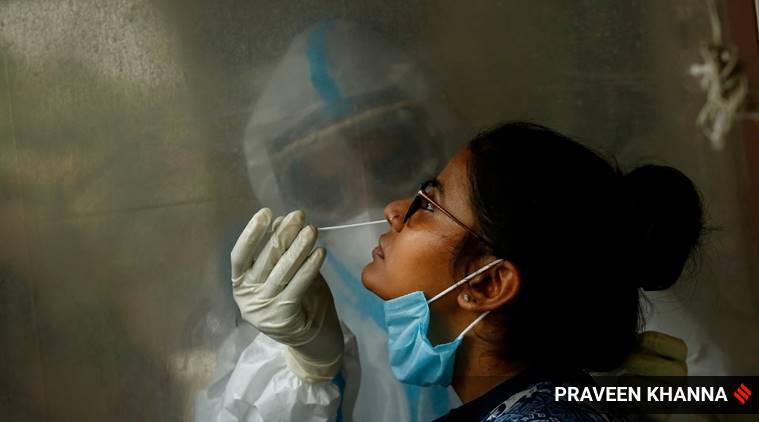COVID vaccine by August 15: ICMR deadline unreasonable, says Indian Academy of Sciences
“The Academy strongly believes that any hasty solution that may compromise rigorous scientific processes and standards will likely have long-term adverse impacts of unforeseen magnitude on citizens of India,” the statement said.
 At a testing centre in New Delhi
At a testing centre in New Delhi
After individual scientists and health experts, the Indian Academy of Sciences (IASc), one of the topmost organisations of scientists in the country, has also questioned the August 15 timeline set by the Indian Council of Medical Research (ICMR) for ‘launching’ a novel Coronavirus vaccine in the country.
Taking note of a widely-circulated letter by ICMR director-general Balram Bhargava in which the August 15 timeline is mentioned, the Indian Academy of Sciences, in a statement released on Sunday morning, said it believed that the “announced timeline was unreasonable and without precedent”.
“The Academy strongly believes that any hasty solution that may compromise rigorous scientific processes and standards will likely have long-term adverse impacts of unforeseen magnitude on citizens of India,” the statement said.
READ | What (and how long) does it take to make a vaccine; what’s the Covid timeline?
“While there is an unquestioned urgent need, vaccine development for use in humans requires scientifically executed clinical trials in a phased manner. These trials involve evaluation of safety (Phase I trial), efficacy and side effects at different dose levels (Phase 2 trial), and confirmation of safety and efficacy in thousands of healthy people (Phase 3 trial) before its release for public use,” it said.
“Clinical trials for a candidate vaccine require the participation of healthy human volunteers. Therefore, many ethical and regulatory approvals need to be obtained prior to the initiation of the trials. While administrative approvals can be expedited, the scientific processes of experimentation and data collection have a natural time span that cannot be hastened without compromising standards of scientific rigour. For example, immune responses usually take several weeks to develop and relevant data should not be collected earlier. Moreover, data collected in one phase must be adequately analysed before next phase can be initiated. If the data of any phases are unacceptable, then the clinical trial is required to be immediately aborted. For example, if the data collected from phase 1 of clinical trial show that the vaccine is not adequately safe, then phase 2 cannot be initiated and the candidate vaccine must be discarded,” it said.
A candidate vaccine developed by Hyderabad-based Bharat Biotech, in collaboration with ICMR’s Pune-based National Institute of Virology, had last week been granted approval to carry out phase 1 and phase 2 clinical trials. The company is still to apply and obtain, approval for phase 3 trials. It was expected that permission for phase 3 trials would be sought only after the first two phases are completed, as is the normal practice. The phase 1 and phase 2 trials are yet to begin and usually take several months to complete. The company itself, in a background note circulated last week, had said it expected the phase 1 and phase 2 trials to be completed only by October, after which phase 3 trials can be initiated.
However, in a letter to the hospitals selected for phase 1 and phase 2 trials, ICMR director-general Balram Bhargava, wrote that “it is envisaged to launch the vaccine for public health use latest by August 15, 2020 after completion of all clinical trials”.
After widespread criticism, the ICMR clarified on Saturday that the letter was only meant to “cut unnecessary red tape”.
“The letter by DG, ICMR to investigators of the clinical trial sites was meant to cut unnecessary red tape, without bypassing any necessary process, and speed up recruitment of participants. Just as red tape was not allowed to become a hindrance in the fast-track approval of the new indigenous testing kits for introducing in the Indian market…, the indigenous vaccine development process has also been sought to be insulated from slow file movement,” ICMR said in a statement on Saturday.








